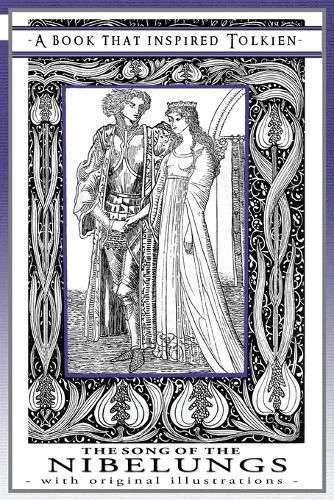Readings Newsletter
Become a Readings Member to make your shopping experience even easier.
Sign in or sign up for free!
You’re not far away from qualifying for FREE standard shipping within Australia
You’ve qualified for FREE standard shipping within Australia
The cart is loading…






This title is printed to order. This book may have been self-published. If so, we cannot guarantee the quality of the content. In the main most books will have gone through the editing process however some may not. We therefore suggest that you be aware of this before ordering this book. If in doubt check either the author or publisher’s details as we are unable to accept any returns unless they are faulty. Please contact us if you have any questions.
THE SONG OF THE NIBELUNGS - With Original Illustrations. A BOOK THAT INSPIRED TOLKIEN. The Song of the Nibelungs (Nibelunglied), a thirteenth century Germanic epic, was a rich source of inspiration for Professor J.R.R. Tolkien, author of The Lord of the Rings. Scholars have noted the influence of its pre-Christian heroic motifs - drawn from historic events and people of the 5th and 6th centuries - on his writing of The Lord of the Rings and The Hobbit. Tolkien was five years old when this beautifully illustrated translation by Margaret Armour was published in England under the title ‘The Fall of the Nibelungs’. Undoubtedly a copy would have made its way into his hands during his boyhood. Armour uses an archaic form of English to preserve the high-flown style of the original poem. Here and there throughout The Lord of the Rings, Tolkien, too, employs this solemn, dignified and majestic form, which is reminiscent of the language of the King James Bible. A glossary of antiquated terms is provided at the back of this book. Armour was the wife of W.B. MacDougall, whose illustrations illuminate the text with their delicate beauty. In his turn, MacDougall was a friend of famous art nouveau illustrator Aubrey Beardsley, and his own drawings echo Beardsley’s style. This classic saga, drenched in blood and tragedy, heroism and honour, beauty and nobility, gives us a glimpse into the literature that helped inform Tolkien’s imagination, ultimately flowering in his most popular work - The Lord of the Rings.
$9.00 standard shipping within Australia
FREE standard shipping within Australia for orders over $100.00
Express & International shipping calculated at checkout
This title is printed to order. This book may have been self-published. If so, we cannot guarantee the quality of the content. In the main most books will have gone through the editing process however some may not. We therefore suggest that you be aware of this before ordering this book. If in doubt check either the author or publisher’s details as we are unable to accept any returns unless they are faulty. Please contact us if you have any questions.
THE SONG OF THE NIBELUNGS - With Original Illustrations. A BOOK THAT INSPIRED TOLKIEN. The Song of the Nibelungs (Nibelunglied), a thirteenth century Germanic epic, was a rich source of inspiration for Professor J.R.R. Tolkien, author of The Lord of the Rings. Scholars have noted the influence of its pre-Christian heroic motifs - drawn from historic events and people of the 5th and 6th centuries - on his writing of The Lord of the Rings and The Hobbit. Tolkien was five years old when this beautifully illustrated translation by Margaret Armour was published in England under the title ‘The Fall of the Nibelungs’. Undoubtedly a copy would have made its way into his hands during his boyhood. Armour uses an archaic form of English to preserve the high-flown style of the original poem. Here and there throughout The Lord of the Rings, Tolkien, too, employs this solemn, dignified and majestic form, which is reminiscent of the language of the King James Bible. A glossary of antiquated terms is provided at the back of this book. Armour was the wife of W.B. MacDougall, whose illustrations illuminate the text with their delicate beauty. In his turn, MacDougall was a friend of famous art nouveau illustrator Aubrey Beardsley, and his own drawings echo Beardsley’s style. This classic saga, drenched in blood and tragedy, heroism and honour, beauty and nobility, gives us a glimpse into the literature that helped inform Tolkien’s imagination, ultimately flowering in his most popular work - The Lord of the Rings.